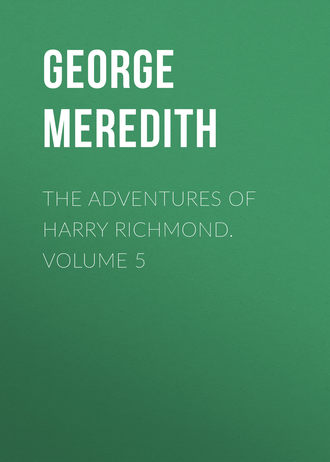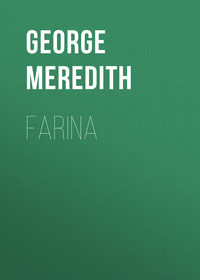
The Adventures of Harry Richmond. Volume 5
My father pledged himself to the hottest secresy, equivalent to a calm denial of the fact, if necessary.
'Pray be at no trouble,' she addressed him.
The 'Where am I?' look was painful in her aspect.
It led me to perceive the difference of her published position in visiting a duellist lover instead of one assassinated. In the latter case, the rashness of an hereditary virgin princess avowing her attachment might pass condoned or cloaked by general compassion. How stood it in the former? I had dragged her down to the duellist's level! And as she was not of a nature to practise concealments, and scorned to sanction them, she was condemned, seeing that concealment as far as possible was imperative, to suffer bitterly in her own esteem. This, the cruellest, was the least of the evils. To keep our names disjoined was hopeless. My weakened frame and mental misery coined tears when thoughts were needed.
Presently I found the room empty of our poor unconscious tormentor.
Ottilia had fastened her hand to mine again.
'Be generous,' I surprised her by saying. 'Go back at once. I have seen you! Let my father escort you the road. You will meet the margravine, or some one. I think, with you, it will be the margravine, and my father puts her in good humour. Pardon a wretched little scheme to save you from annoyance! So thus you return within a day, and the margravine, shelters you. Your name will not be spoken. But go at once, for the sake of Prince Ernest. I have hurt him already; help me to avoid doing him a mortal injury. It was Schwartz who drove you? our old Schwartz ! Old Warhead! You see, we may be safe; only every fresh minute adds to the danger. And another reason for going-another—'
'Ah!' she breathed, 'my Harry will talk himself into a fever.'
'I shall have it if the margravine comes here.'
'She shall not be admitted.'
'Or if I hear her, or hear that she has come! Consent at once, and revive me. Oh! I am begging you to leave me, and wishing it with all my soul. Think over what I have done. Do not write to me. I shall see the compulsion of mere kindness between the lines. You consent. Your wisdom I never doubt—I doubt my own.'
'When it is yours you would persuade me to confide in?' said she, with some sorrowful archness.
Wits clear as hers could see that I had advised well, except in proposing my father for escort. It was evidently better that she should go as she came.
I refrained from asking her what she thought of me now. Suing for immediate pardon would have been like the applying of a lancet to a vein for blood: it would have burst forth, meaning mere words coloured by commiseration, kindness, desperate affection, anything but her soul's survey of herself and me; and though I yearned for the comfort passion could give me, I knew the mind I was dealing with, or, rather, I knew I was dealing with a mind; and I kept my tongue silent. The talk between us was of the possible date of my recovery, the hour of her return to the palace, the writer of the unsigned letters, books we had read apart or peeped into together. She was a little quicker in speech, less meditative. My sensitive watchfulness caught no other indication of a change.
My father drove away an hour in advance of the princess to encounter the margravine.
'By,' said he, rehearsing his exclamation of astonishment and delight at meeting her, 'by the most miraculous piece of good fortune conceivable, dear madam. And now comes the question, since you have condescended to notice a solitary atom of your acquaintance on the public highroad, whether I am to have the honour of doubling the freight of your carriage, or you will deign to embark in mine? But the direction of the horses' heads must be reversed, absolutely it must, if your Highness would repose in a bed to-night. Good. So. And now, at a conversational trot, we may happen to be overtaken by acquaintances.'
I had no doubt of his drawing on his rarely-abandoned seven-league boots of jargon, once so delicious to me, for the margravine's entertainment. His lack of discernment in treating the princess to it ruined my patience.
The sisters Aennchen and Lieschen presented themselves a few minutes before his departure. Lieschen dropped at her feet.
'My child,' said the princess, quite maternally, 'could you be quit of your service with the Mahrlens for two weeks, think you, to do duty here?'
'The Professor grants her six hours out of the twenty-four already,' said
I.
'To go where?' she asked, alarmed.
'To come here.'
'Here? She knows you? She did not curtsey to you.'
'Nurses do not usually do that.'
The appearance of both girls was pitiable; but having no suspicion of the cause for it, I superadded,
'She was here this morning.'
'Ah! we owe her more than we were aware of.'
The princess looked on her kindly, though with suspense in the expression.
'She told me of my approaching visitor,' I said.
'Oh! not told!' Lieschen burst out.
'Did you,'—the princess questioned her, and murmured to me, 'These children cannot speak falsehoods,' they shone miserably under the burden of uprightness 'did you make sure that I should come?'
Lieschen thought—she supposed. But why? Why did she think and suppose? What made her anticipate the princess's arrival? This inveterate why communicated its terrors to Aennchen, upon whom the princess turned scrutinizing eyes, saying, 'You write of me to your sister?'
'Yes, princess.'
'And she to you?'
Lieschen answered: 'Forgive me, your Highness, dearest lady!'
'You offered yourself here unasked?'
'Yes, princess.'
'Have you written to others besides your sister?'
'Seldom, princess; I do not remember.'
'You know the obligation of signatures to letters?'
'Ah!'
'You have been remiss in not writing to me, child.'
'Oh, princess! I did not dare to.'
'You have not written to me?'
'Ah! princess, how dared I?'
'Are you speaking truthfully?'
The unhappy girls stood trembling. Ottilia spared them the leap into the gulfs of confession. Her intuitive glance, assisted by a combination of minor facts, had read the story of their misdeeds in a minute. She sent them down to the carriage, suffering her culprits to kiss her fingers; while she said to one: 'This might be a fable of a pair of mice.'
When she was gone, after many fits of musing, the signification of it was revealed to my slower brain. I felt that it could not but be an additional shock to the regal pride of such a woman that these little maidens should have been permitted to act forcibly on her destiny. The mystery of the letters was easily explained as soon as a direct suspicion fell on one of the girls who lived in my neighbourhood and the other who was near the princess's person. Doubtless the revelation of their effective mouse plot had its humiliating bitterness for her on a day of heavy oppression, smile at it as she subsequently might. The torture of heart with which I twisted the meaning of her words about the pair of mice to imply that the pair had conspired to make a net for an eagle and had enmeshed her, may have struck a vein of the truth. I could see no other antithesis to the laudable performance of the single mouse of fable. Lieschen, when she next appeared in the character of nurse, met my inquiries by supplicating me to imitate her sister's generous mistress, and be merciful.
She remarked by-and-by, of her own accord: 'Princess Ottilia does not regret that she had us educated.'
A tender warmth crept round me in thinking that a mind thus lofty would surely be, however severe in its insight, above regrets and recantations.
CHAPTER XXXIV
I GAIN A PERCEPTION OF PRINCELY STATE
I had a visit from Prince Ernest, nominally one of congratulation on my escape. I was never in my life so much at any man's mercy: he might have fevered me to death with reproaches, and I expected them on hearing his name pronounced at the door. I had forgotten the ways of the world. For some minutes I listened guardedly to his affable talk. My thanks for the honour done me were awkward, as if they came upon reflection. The prince was particularly civil and cheerful. His relative, he said, had written of me in high terms—the very highest, declaring that I was blameless in the matter, and that, though he had sent the horse back to my stables, he fully believed in the fine qualities of the animal, and acknowledged his fault in making it a cause of provocation. To all of which I assented with easy nods.
'Your Shakespeare, I think,' said the prince, 'has a scene of young Frenchmen praising their horses. I myself am no stranger to the enthusiasm: one could not stake life and honour on a nobler brute. Pardon me if I state my opinion that you young Englishmen of to-day are sometimes rather overbearing in your assumption of a superior knowledge of horseflesh. We Germans in the Baltic provinces and in the Austrian cavalry think we have a right to a remark or two; and if we have not suborned the testimony of modern history, the value of our Hanoverian troopers is not unknown to one at least of your Generals. However, the odds are that you were right and Otto wrong, and he certainly put himself in the wrong to defend his ground.'
I begged him to pass a lenient sentence upon fiery youth. He assured me that he remembered his own. Our interchange of courtesies was cordially commonplace: we walked, as it were, arm-in-arm on thin ice, rivalling one another's gentlemanly composure. Satisfied with my discretion, the prince invited me to the lake-palace, and then a week's shooting in Styria to recruit. I thanked him in as clear a voice as I could command:
'Your Highness, the mine flourishes, I trust?'
'It does; I think I may say it does,' he replied. 'There is always the want of capital. What can be accomplished, in the present state of affairs, your father performs, on the whole, well. You smile—but I mean extraordinarily well. He has, with an accountant at his elbow, really the genius of management. He serves me busily, and, I repeat, well. A better employment for him than the direction of Court theatricals?'
'Undoubtedly it is.'
'Or than bestriding a bronze horse, personifying my good ancestor! Are you acquainted with the Chancellor von Redwitz?'
'All I know of him, sir, is that he is fortunate to enjoy the particular confidence of his master.'
'He has a long head. But, now, he is a disappointing man in action; responsibility overturns him. He is the reverse of Roy, whose advice I do not take, though I'm glad to set him running. Von Redwitz is in the town. He shall call on you, and amuse an hour or so of your convalescence.'
I confessed that I began to feel longings for society.
Prince Ernest was kind enough to quit me without unmasking. I had not to learn that the simplest visits and observations of ruling princes signify more than lies on the surface. Interests so highly personal as theirs demand from them a decent insincerity.
Chancellor von Redwitz called on me, and amused me with secret anecdotes of all the royal Houses of Germany, amusing chiefly through the veneration he still entertained for them. The grave senior was doing his utmost to divert one of my years. The immoralities of blue blood, like the amours of the Gods, were to his mind tolerable, if not beneficial to mankind, and he presumed I should find them toothsome. Nay, he besought me to coincide in his excuses of a widely charming young archduchess, for whom no estimable husband of a fitting rank could anywhere be discovered, so she had to be bestowed upon an archducal imbecile; and hence—and hence—Oh, certainly! Generous youth and benevolent age joined hands of exoneration over her. The princess of Satteberg actually married, under covert, a colonel of Uhlans at the age of seventeen; the marriage was quashed, the colonel vanished, the princess became the scandalous Duchess of Ilm-Ilm, and was surprised one infamous night in the outer court of the castle by a soldier on guard, who dragged her into the guard-room and unveiled her there, and would have been summarily shot for his pains but for the locket on his breast, which proved him to be his sovereign's son.—A perfect romance, Mr. Chancellor. We will say the soldier son loved a delicate young countess in attendance on the duchess. The countess spies the locket, takes it to the duchess, is reprimanded, when behold! the locket opens, and Colonel von Bein appears as in his blooming youth, in Lancer uniform.—Young sir, your piece of romance has exaggerated history to caricature. Romances are the destruction of human interest. The moment you begin to move the individuals, they are puppets. 'Nothing but poetry, and I say it who do not read it'– (Chancellor von Redwitz is the speaker)'nothing but poetry makes romances passable: for poetry is the everlastingly and embracingly human. Without it your fictions are flat foolishness, non-nourishing substance—a species of brandy and gruel!—diet for craving stomachs that can support nothing solider, and must have the weak stuff stiffened. Talking of poetry, there was an independent hereditary princess of Leiterstein in love with a poet!—a Leonora d'Este!—This was no Tasso. Nevertheless, she proposed to come to nuptials. Good, you observe? I confine myself to the relation of historical circumstances; in other words, facts; and of good or bad I know not.'
Chancellor von Redwitz smoothed the black silk stocking of his crossed leg, and set his bunch of seals and watch-key swinging. He resumed, entirely to amuse me,
'The Princess Elizabeth of Leiterstein promised all the qualities which the most solicitous of paternal princes could desire as a guarantee for the judicious government of the territory to be bequeathed to her at his demise. But, as there is no romance to be extracted from her story, I may as well tell you at once that she did not espouse the poet.'
'On the contrary, dear Mr. Chancellor, I am interested in the princess.
Proceed, and be as minute as you please.'
'It is but a commonplace excerpt of secret historical narrative buried among the archives of the Family, my good Mr. Richmond. The Princess Elizabeth thoughtlessly pledged her hand to the young sonneteer. Of course, she could not fulfil her engagement.'
'Why not?'
'You see, you are impatient for romance, young gentleman.'
'Not at all, Mr. Chancellor. I do but ask a question.'
'You fence. Your question was dictated by impatience.'
'Yes, for the facts and elucidations!
'For the romance, that is. You wish me to depict emotions.'
Hereupon this destroyer of temper embrowned his nostrils with snuff, adding,—'I am unable to.'
'Then one is not to learn why the princess could not fulfil her engagement?'
'Judged from the point of view of the pretender to the supreme honour of the splendid alliance, the fault was none of hers. She overlooked his humble, his peculiarly dubious, birth.'
'Her father interposed?'
'No.'
'The Family?'
'Quite inefficacious to arrest her determinations.'
'What then—what was in her way?'
'Germany.'
'What?'
'Great Germany, young gentleman. I should have premised that, besides mental, she had eminent moral dispositions,—I might term it the conscience of her illustrious rank. She would have raised the poet to equal rank beside her had she possessed the power. She could and did defy the Family, and subdue her worshipping father, the most noble prince, to a form of paralysis of acquiescence—if I make myself understood. But she was unsuccessful in her application for the sanction of the Diet.'
'The Diet?'
'The German Diet. Have you not lived among us long enough to know that the German Diet is the seat of domestic legislation for the princely Houses of Germany? A prince or a princess may say, "I will this or that." The Diet says, "Thou shalt not"; pre-eminently, "Thou shalt not mix thy blood with that of an impure race, nor with blood of inferiors." Hence, we have it what we see it, a translucent flood down from the topmost founts of time. So we revere it. "Qua man and woman," the Diet says, by implication, "do as you like, marry in the ditches, spawn plentifully. Qua prince and princess, No! Your nuptials are nought. Or would you maintain them a legal ceremony, and be bound by them, you descend, you go forth; you are no reigning sovereign, you are a private person." His Serene Highness the prince was thus prohibited from affording help to his daughter. The princess was reduced to the decision either that she, the sole child born of him in legal wedlock, would render him qua prince childless, or that she would—in short, would have her woman's way. The sovereignty of Leiterstein continued uninterruptedly with the elder branch. She was a true princess.'
'A true woman,' said I, thinking the sneer weighty.
The Chancellor begged me to recollect that he had warned me there was no romance to be expected.
I bowed; and bowed during the remainder of the interview.
Chancellor von Redwitz had performed his mission. The hours of my convalescence were furnished with food for amusement sufficient to sustain a year's blockade; I had no further longing for society, but I craved for fresh air intensely.
Did Ottilia know that this iron law, enforced with the might of a whole empire, environed her, held her fast from any motion of heart and will? I could not get to mind that the prince had hinted at the existence of such a law. Yet why should he have done so? The word impossible, in which he had not been sparing when he deigned to speak distinctly, comprised everything. More profitable than shooting empty questions at the sky was the speculation on his project in receiving me at the palace, and that was dark. My father, who might now have helped me, was off on duty again.
I found myself driving into Sarkeld with a sense of a whirlwind round my head; wheels in multitudes were spinning inside, striking sparks for thoughts. I met an orderly in hussar uniform of blue and silver, trotting on his errand. There he was; and whether many were behind him or he stood for the army in its might, he wore the trappings of an old princely House that nestled proudly in the bosom of its great jealous Fatherland. Previously in Sarkeld I had noticed members of the diminutive army to smile down on them. I saw the princely arms and colours on various houses and in the windows of shops. Emblems of a small State, they belonged to the history of the Empire. The Court- physician passed with a bit of ribbon in his buttonhole. A lady driving in an open carriage encouraged me to salute her. She was the wife of the Prince's Minister of Justice. Upon what foundation had I been building?
A reflection of the ideas possessing me showed Riversley, my undecorated home of rough red brick, in the middle of barren heaths. I entered the palace, I sent my respects to the prince. In return, the hour of dinner was ceremoniously named to me: ceremony damped the air. I had been insensible to it before, or so I thought, the weight was now so crushing. Arms, emblems, colours, liveries, portraits of princes and princesses of the House, of this the warrior, that the seductress, burst into sudden light. What had I to do among them?
The presence of the living members of the Family was an extreme physical relief.
For the moment, beholding Ottilia, I counted her but as one of them. She welcomed me without restraint.
We chattered pleasantly at the dinner-table.
'Ah! You missed our French troupe,' said the margravine.'
'Yes,' said I, resigning them to her. She nodded:
'And one very pretty little woman they had, I can tell you—for a
Frenchwoman.'
'You thought her pretty? Frenchwomen know what to do with their brains and their pins, somebody has said.'
'And exceedingly well said, too. Where is that man Roy? Good things always remind me of him.'
The question was addressed to no one in particular. The man happened to be my father, I remembered. A second allusion to him was answered by Prince Ernest:
'Roy is off to Croatia to enrol some dozens of cheap workmen. The strength of those Croats is prodigious, and well looked after they work. He will be back in three or four or more days.'
'You have spoilt a good man,' rejoined the margravine; 'and that reminds me of a bad one—a cutthroat. Have you heard of that creature, the princess's tutor? Happily cut loose from us, though! He has published a book—a horror! all against Scripture and Divine right! Is there any one to defend him now, I should like to ask?'
'I,' said Ottilia.
'Gracious me! you have not read the book?'
'Right through, dear aunt, with all respect to you.'
'It 's in the house?'
'It is in my study.'
'Then I don't wonder! I don't wonder!' the margravine exclaimed.
'Best hear what the enemy has to say,' Prince Ernest observed.
'Excellently argued, papa, supposing that he be an enemy.'
'An enemy as much as the fox is the enemy of the poultry-yard, and the hound is the enemy of the fox!' said the margravine.
'I take your illustration, auntie,' said Ottilia. 'He is the enemy of chickens, and only does not run before the numbers who bark at him. My noble old Professor is a resolute truth-seeker: he raises a light to show you the ground you walk on. How is it that you, adoring heroes as you do, cannot admire him when he stands alone to support his view of the truth! I would I were by him! But I am, whenever I hear him abused.'
'I daresay you discard nothing that the wretch has taught you!'
'Nothing! nothing!' said Ottilia, and made my heart live.
The grim and taciturn Baroness Turckems, sitting opposite to her, sighed audibly.
'Has the princess been trying to convert you?' the margravine asked her.
'Trying? no, madam. Reading? yes.'
'My good Turckems! you do not get your share of sleep?'
'It is her Highness the princess who despises sleep.'
'See there the way with your free-thinkers! They commence by treading under foot the pleasantest half of life, and then they impose their bad habits on their victims. Ottilia! Ernest! I do insist upon having lights extinguished in the child's apartments by twelve o'clock at midnight.'
'Twelve o'clock is an extraordinary latitude for children,' said Ottilia, smiling.
The prince, with a scarce perceptible degree of emphasis, said,
'Women born to rule must be held exempt from nursery restrictions.'
Here the conversation opened to let me in. More than once the margravine informed me that I was not the equal of my father.
'Why,' said she, 'why can't you undertake this detestable coal-mine, and let your father disport himself?'
I suggested that it might be because I was not his equal. She complimented me for inheriting a spark of Roy's brilliancy.
I fancied there was a conspiracy to force me back from my pretensions by subjecting me to the contemplation of my bare self and actual condition. Had there been, I should have suffered from less measured strokes. The unconcerted design to humiliate inferiors is commonly successfuller than conspiracy.
The prince invited me to smoke with him, and talked of our gradual subsidence in England to one broad level of rank through the intermixture by marriage of our aristocracy, squirearchy, and merchants.
'Here it is not so,' he said; 'and no democratic rageings will make it so. Rank, with us, is a principle. I suppose you have not read the Professor's book? It is powerful—he is a powerful man. It can do no damage to the minds of persons destined by birth to wield authority— none, therefore, to the princess. I would say to you—avoid it. For those who have to carve their way, it is bad. You will enter your Parliament, of course? There you have a fine career.'
He asked me what I had made of Chancellor von Redwitz.
I perceived that Prince Ernest could be cool and sagacious in repairing what his imprudence or blindness had left to occur: that he must have enlightened his daughter as to her actual position, and was most dexterously and devilishly flattering her worldly good sense by letting it struggle and grow, instead of opposing her. His appreciation of her intellect was an idolatry; he really confided in it, I knew; and this reacted upon her. Did it? My hesitations and doubts, my fantastic raptures and despair, my loss of the power to appreciate anything at its right value, revealed the madness of loving a princess.









